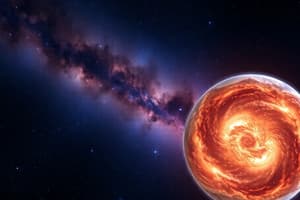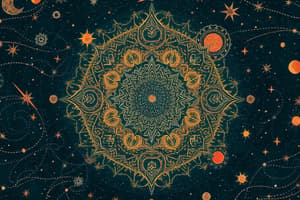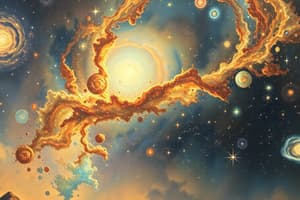Podcast
Questions and Answers
What fraction of the universe is comprised of baryonic matter?
What fraction of the universe is comprised of baryonic matter?
- 10%
- 20%
- 5% (correct)
- 30%
Which element is primarily involved in the process of nuclear fusion in stars?
Which element is primarily involved in the process of nuclear fusion in stars?
- Oxygen
- Helium
- Hydrogen (correct)
- Carbon
What is the role of dark energy in the universe?
What is the role of dark energy in the universe?
- It forms black holes.
- It creates baryonic matter.
- It emits light.
- It is responsible for the universe's expansion. (correct)
Approximately how many galaxies are estimated to exist in the universe?
Approximately how many galaxies are estimated to exist in the universe?
What is dark matter primarily characterized by?
What is dark matter primarily characterized by?
Which of the following best describes a galaxy?
Which of the following best describes a galaxy?
What is the approximate diameter of the observable universe?
What is the approximate diameter of the observable universe?
What is primarily responsible for the formation of all other elements in the universe?
What is primarily responsible for the formation of all other elements in the universe?
How far apart are galaxies on average?
How far apart are galaxies on average?
What type of matter includes planets, stars, and comets?
What type of matter includes planets, stars, and comets?
Flashcards are hidden until you start studying
Study Notes
Components of the Universe
- The universe consists of three main components: baryonic matter, dark matter, and dark energy.
- Baryonic matter (ordinary matter) includes protons and neutrons, making up celestial bodies like planets, stars, comets, meteors, and asteroids.
- Dark matter comprises particles that do not interact with light, making it invisible; black holes are a common example.
- Dark energy is the enigmatic force driving the universe's expansion and is not yet fully understood.
- Approximate composition of the universe:
- Baryonic matter: 5%
- Dark matter: 24%
- Dark energy: 71%
Chemical Composition: Hydrogen and Helium
- Hydrogen and helium account for nearly 99% of the universe's chemical makeup.
- Most stars primarily consist of hydrogen.
- Nuclear fusion occurs when hydrogen atoms combine to form helium, leading to other element formations.
- Hydrogen and helium are the lightest elements, playing a crucial role in the universe's chemistry.
The Expanding Universe
- The universe encompasses various astronomical bodies and is in a state of expansion.
- A star is an astronomical entity composed of plasma capable of generating heat and light.
- A galaxy consists of numerous stars; one galaxy can contain around 100 billion stars.
- Estimates suggest there are approximately 2 trillion galaxies within the universe.
- The average distance between galaxies can reach nearly 10 million light years.
- Observable universe is about 93 billion light years in diameter, highlighting the vastness of space.
- Dark energy is the force responsible for the ongoing expansion of the universe.
Studying That Suits You
Use AI to generate personalized quizzes and flashcards to suit your learning preferences.




